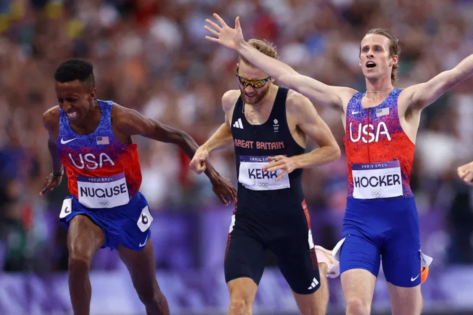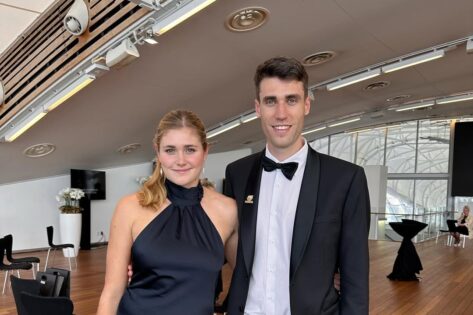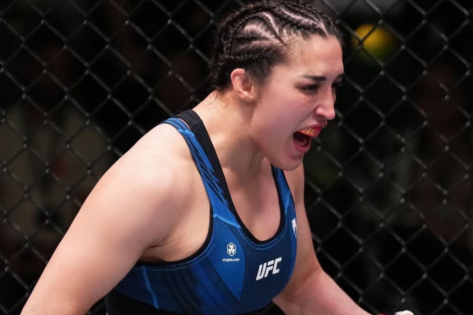With its mix of elite talent, big money, and bold personalities, the Grand Slam Track series is redefining the future of track and field. After a hyped opening leg, unexpected performances sent shockwaves through the leaderboard. Momentum shifted, strategies crumbled, and new names rose — not just with speed but by delivering under serious pressure. Now, as the dust settles for the first slam, one thing is clear: the path to slam glory won’t follow the old script. And with names like Cole Hocker and Yared Nuguse, it seems to be in question.
Everyone thought they knew how this first leg would play out — the 1500m stars were supposed to cruise, right? But from the moment the races kicked off, things felt… different. The usual rhythm was off, some bold moves paid off big, and suddenly, a few unexpected names were shaking up the entire leaderboard. It’s early in the series, sure — but if this opening act taught us anything, it’s that no one’s lane is guaranteed. And the pressure? It’s only just begun.
Coming in, all eyes were on 1500m stars like Cole Hocker and Yared Nuguse, widely tipped to dominate over the endurance-focused format. But what played out left fans — and even analysts — stunned. As Chris Chavez put it, talking to CBC Olympics, “A lot of people went into the weekend thinking that, oh, it’s the 1500 meter specialists who are going to run the tables with the 800 meter competitors.” But the results told a different story. Emmanuel Wanyonyi, the 800m specialist from France, walked away with the overall win, finishing in 3:35.18— grabbing the $100,000 top prize.
Marco Arop proved he has what it takes to be a potential @grandslamtrack champ @CitiusMag’s @ChrisChavez breaks down the best and worst from Grand Slam Track’s debut: https://t.co/YPniGXeS1c pic.twitter.com/gSVuWxsB6n
— CBC Olympics (@CBCOlympics) April 8, 2025
Chavez captured it cleanly; he further said, “It actually ended up being the flip side — with Yoni stealing the slam and Marco taking second overall.” Marco Arop, Canada’s reigning world champ in the 800m, finished second and secured a $50,000 paycheck. Meanwhile, Yared Naguse secured second place in 3:35.36. Josh Kerr, the world champion, finished seventh in 3:35.61. Cole Hocker? Well, he finished third with 3:35.52. It wasn’t about one-off failures. It was a format test — three rounds in 48 hours — and the 800m specialists passed with style. Marco’s performance in particular sent a message. He wasn’t just surviving the rounds — he was challenging the narrative. “Marco proved that he can run well enough to come away as a potential slam champion in the next couple of stops,” said Chavez.
There’s also a bigger entertainment layer in play. In a field where personalities matter just as much as pacing, Marco stepped into that spotlight with confidence. “Track needs that hero-villain narrative — and whether you love him or hate him, you’re still going to watching, you know, when Josh Kerr lines up to race,” Chavez explained. With Miami up next, the pressure shifts to the early favorites, who now must adapt both tactically and mentally.
“Come Miami, you’re going to have to see the 1500 meter specialists try and tweak with the format of how they’re going to approach these races,” Chavez emphasized. Because clearly, the 800m runners didn’t just show up — they set the tone. Though there are still three slams left, GST is making headlines regardless.
Grand Slam Track has somewhat changed a lot in track and field
Let’s be honest—track and field hasn’t always had the spotlight it deserves. But the new Grand Slam Track series result? It’s flipping the script. Instead of the usual pacer-led, lightning-fast races we’re used to in Diamond League meets, GST is going raw and real. No pacemakers, no field events—just head-to-head, all-out track battles. And the stakes? They’re sky-high. With $12.5 million on the line across four global stops, the vibe is more fight night than track meet.
Take the Kingston opener, for example. American Kenny Bednarek walked away with double wins in the 100m and 200m, stacking up 24 points. On the distant side, Matthew Hudson-Smith took the 400m crown and pocketed $100,000. Sydney McLaughlin-Levrone and Gabby Thomas? Both showed out in their GST debuts, proving this format isn’t just hype—it’s high-stakes history in the making. Thomas became the first Grand Slam champion—winning the women’s 200m and finishing second in the 400m.
Sydney McLaughlin-Levrone wrapped up her weekend in style, cruising to a 50.32 in the 400m—cool, calm, and totally in control. That was more than enough to seal the deal. Andrenette Knight followed with a 52.09, while Dalilah Muhammad wasn’t far behind at 52.21. With 24 points across the 400m and 400m hurdles, Sydney claimed the women’s long hurdles Grand Slam crown—and yep, she’s walking away with her first Slam title and a $100K payday.
But here’s the twist—some big names like Jakob Ingebrigtsen and Noah Lyles were nowhere to be seen. Which raises the question: in this new, athlete-versus-athlete arena, who’s really built for the pressure? With the next stop in Miami just around the corner, the series isn’t just heating up—it’s rewriting the playbook.
The post American Cole Hocker and Yared Nuguse’s Performance in Question After Unexpected Names Grab $150,000 Paycheck appeared first on EssentiallySports.



